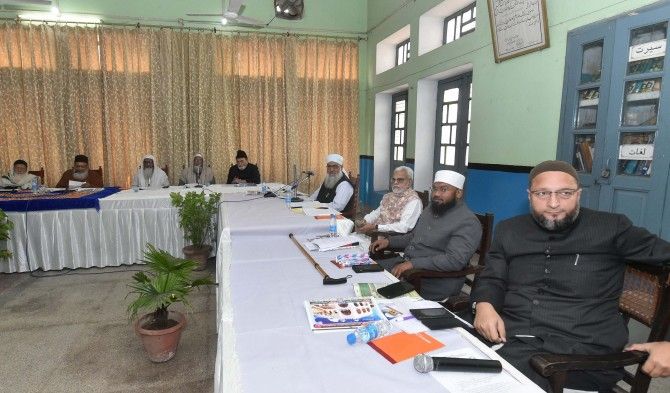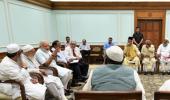'They must take the bull of conservatism within their own ranks by its horns as much as they need to speak out against the fallacies of the non-Hindutva (or 'Muslim-friendly') political forces as well,' argues Mohammad Sajjad.

IMAGE: Maulana Rabe Hasani Nadvi, president, All India Muslim Personal Law Board; Wali Rahmani, general secretary; Khalid Saifullaha Rahmani, assistant general secretary; Fazlurrahman, secretary; and senior member Zafaryab Jjilani, Asaduddin Owaisi, MP, and other Muslim leaders attend a meeting on triple talaq in Lucknow, December 24, 2017. Photograph: Nand Kumar/PTI Photo
For a student of India's political history, the stories preceding and following communal violence may well be significant entry points to evaluate the real character of non-Hindutva political parties.
These would also be significant to evaluate the Muslim leadership in India, and their relationship with the 'secular' parties.
These would help gauge and comprehend why Indian secularism has lost its socio-political credibility so fatally in our times.
The latest case in point is the kind of hidden truths which are emerging now pertaining to communal 'violence unleashed by MP Yogi Adityanath and his henchmen' in Gorakhpur in late January 2007, a few months before the UP assembly election.
It needs to be noted that the then chief minister Mulayam Yadav removed the officers who had jailed the BJP MP (Adityanath). The officers' successors had gone to Adityanath, seeking his forgiveness!
The political scenario then was described by Apoorvanand (Tehelka, February 17, 2007) thus:
'One should know that he (Adityanath) is a Thakur (Rajput); a Thakur (Rajnath Singh) heads the BJP now and the Samajwadi Party is also being run by a powerful Thakur (Amar Singh).'
'The Thakurs spread across party lines ensure that Adityanath is allowed to have his own way in his fiefdom, Poorvanchal...'
'Muslims have been given to understand that neither the Bahujan Samaj Party nor the SP is willing to rein him in.'
'Perhaps the SP is seeking to counter Mayawati's Brahmin card with its own Thakur card by indulging him. The Congress is nowhere and also lacks a will to take him on.'
'All this leaves the Muslims here with no option but to resign themselves to their fate.'
A few months later, in 2007, Gorakhpur-based journalist Parvez Parwaz filed a criminal complaint with the police against Adityanath for his speech and violence.
But for ten years, the successive governments of chief ministers Mulayam Singh Yadav, Mayawati and Akhilesh Yadav failed to prosecute Adityanath (Ajit Sahi, The Wire, February 22, 2018).
In April 2008, Parwaz submitted a CD containing Adityanath's hate speech to the chief judicial magistrate in Gorakhpur. This was never sent for forensic examination.
Between 2007 and 2012, there were around 70 Muslim legislators in the Uttar Pradesh assembly, including the fire-spitting law graduate Azam Khan. It turns out that even they preferred to remain silent on this issue.
Civil rights activists kept themselves oblivious of the reprieve provided to Adityanath by the supposedly 'Muslim-friendly' regimes of the Samajwadi Party and Bahujan Samaj Party who were in power in UP between 2007 and 2017.
Would it surprise us then why Akhilesh-Azam failed to prevent the Muzaffarnagar riots in 2013? In fact, one could argue that the Akhilesh-Azam duo engineered this polarisation, to draw the Rashtriya Lok Dal and BSP's Muslim base to the SP fold, and to push the RLD and BSP's Jat and Dalit base towards the BJP. (Please read my column, August 5, 2013).
It is another matter that this spun out of their control and only the BJP reaped the harvest in the 2014 Lok Sabha election.
Shockingly, as the expose about the Adityanath CD emerged in the public domain, otherwise, loud-mouthed Muslims active on social media, speaking out against Hindutva forces, day in and day out, are almost silent.
This silence needs to be decoded and interpreted. How and why do the Muslim leadership -- political and intelligentsia (modern educated and clergy) -- behave the way they do?
One explanation could be this: 'Muslim-friendly' regimes co-opt articulate segments of the Muslim community. They therefore find comfort in silence and docility in order to safeguard whatever loaves and fishes they secure from the party in power.
Secondly, not bringing Hindutva hot-heads to book, keeps Muslims scared.
Scared minorities are slavish and unflinching people who vote for such secularists en bloc.
All through these years, when reactionary majoritarian Hindus were a marginal force, this tactic worked very well for the Congress first, and then for regional single caste/family- based parties.
It is only now, when the Hindutva forces have become dominant, that the politics of communal polarisation eventually benefits only the BJP, and none else.
It is this situation which has left political forces like the SP, BSP, Rashtriya Janata Dal etc confounded and at the receiving end.
Probably because of this, we did not see civil rights activists chasing erring police officials and politicians responsible for the Bhagalpur riots (1988-1990), the Sitamarhi-Riga riots (1992), or even the Gorakhpur riots (2007).
Contrast it with the Gujarat riots (2002) when complicit officers and politicians were chased, prosecuted. In the Gujarat riots, politicians such as Amit Shah were not chased adequately by the Congress which then had central agencies at its disposal.
Many would admit that a Hindutva regime in Gujarat was useful for the Congress to get Muslim votes en bloc in the rest of India. It helped the Congress in fear-mongering.
Likewise, in the Gorakhpur riots (January 2007), Adityanath was not implicated and prosecuted, despite the local journalist's efforts.
Instances of these riots carry extraordinary relevance here. Hence, we need to look into many aspects of its history.
In the Riga riots (1992), Imarat-e-Shariah kind of organisations did not even go there to distribute relief, which they have been doing since their foundation in 1921.
Various shades of political and apolitical Muslim leadership never asked for an inquiry and prosecution. Why?
Was it because articulate segments of the Muslim leadership were co-opted by the Lalu Yadav-Rabri Devi regime?
Was it because the Urdu press (which has reach and influence with segments of Muslims) was silenced by the Lalu-Rabri regime? Just as the Urdu media now maintains a silence on the expose against Salman Nadvi, a member of the Muslim Personal Law Board.
Despite the expose, the MPLB has only 'dissociated itself' from Nadvi rather than initiate any disciplinary action. Insiders confide that most MPLB members are sympathetic to Nadvi.
Today, the Imarat-e-Shariah (Patna), the Muslim Personal Law Board (now hijacked by firebrand politician Asaduddin Owaisi), are up in arms against the Supreme Court verdict, prohibiting instant triple divorce.
This is a practice not sanctioned by the Sharia, and therefore done away with in so many Muslim majority countries across the globe. Yet, they are mobilising Muslim men and women on a sensationally large scale.
On April 15, the Imarat-e-Shariah will convene a Deen (faith) Bachao, Desh Bachao conference in Patna, a kind of clarion call of 'Islam in danger'.
This will inevitably create communal polarisation, the way it did in 1986.
The clergy and other shades of Muslim leadership do not undertake such mobilisation on issues of law and order, on the failure of criminal justice delivery in communal riots, on education, health care, on the farm crisis, on roads and electricity, etc.
As if economic security cannot take care of their religio-cultural concerns!
Only emotive and misleadingly interpreted religiosity remains the prioritised concern of the Muslim leadership.
These kinds of forces brought Muslims out on the streets against the Supreme Court verdict giving justice to Shah Bano in 1985-1986, thereby leaving divorced women quite helpless, hapless, destitute and deserted.
Having nullified the judicial verdict through Parliamentary legislation, they did not erect an institution of endowment which could take care of destitute and deserted women.
This was a tremendous moral responsibility for the Muslim Personal Law Board to have done. But it wants to continue with instant triple divorce to perpetuate the subjugation of women.
Why did the MPLB become a party to the issue in the Supreme Court when it did not have to honour its verdict? Nor is it coming out with a draft Bill for public debate!
Even worse, the modern educated Muslim intelligentsia (whatever their proportion) once again is not speaking out loud enough against the MPLB's regressive stance.
Some of these segments remain dishonestly silent on all such regressivism. Far from repenting the colossal mistake of 1986, they try to conveniently hide behind the argument that the campaign to legislate against the judicial verdict in 1986 was within Constitutionally sanctioned means.
They are still not ashamed of having denied justice to women. Centres of women's studies in universities are not reaching out to women as an awareness campaign to disentangle them from the misogynist clergy.
Such a hypocritical, self-contradictory, dishonest and questionable convenience of Muslim liberals and secular parties will not help the cause of India's secular-plural democracy and its vulnerable minorities.
It is high time, while they feel beleaguered at the hands of Hindutva forces, in and beyond State power, various shades of Muslim leadership should assert, and re-articulate their priorities.
They must confess their mistakes of the past, and move ahead for course correction. That is, if they are really serious about fighting minority and majority communalism.
The Muslim role in Indian politics needs a re-definition.
They must take the bull of conservatism within their own ranks by its horns as much as they need to speak out against the fallacies of the non-Hindutva (or 'Muslim-friendly') political forces as well.
Likewise, the secular political parties should speak out against Muslim conservatives un-inhibitively and eloquently.
Gone are the days of hobnobbing with minority conservatism and communalism if majority communalism has to be fought out effectively.
Professor Mohammad Sajjad is at the Centre of Advanced Study in History, Aligarh Muslim University.
He has published two books: Contesting Colonialism and Separatism: Muslims of Muzaffarpur since 1857 (2014) and Muslim Politics in Bihar: Changing Contours (Routledge, 2014/2018 reprint).











 © 2025
© 2025